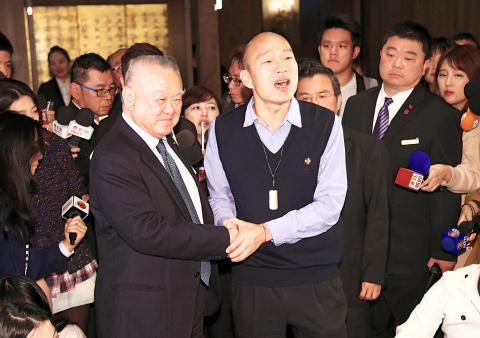Kaohsiung Mayor Han Kuo-yu (韓國瑜) on Thursday sought to assuage controversy over remarks he made about Filipino white-collar workers, saying that Taiwanese parents would need time to accept Philippine English teachers.
At a meeting of the Chinese National Association of Industry and Commerce in Taipei on Wednesday, Han said he feared that hiring educated employees from the Philippines “would cause a psychological shock for Taiwanese, because [they might wonder]: How come our ‘Maria’ has become a teacher?”
The term “Maria” is a slur widely used in Taiwan to refer to migrant workers, especially those working as a caregivers.

Photo: CNA
Han made the remark after a participant said that Kaohsiung’s lack of highly educated workers is the city’s biggest problem, especially middle and top-tier professionals who speak English and are internationally mobile.
The mayor should cooperate with the national government and local enterprises to bring in white-collar, English-speaking workers from the Philippines, the participant said.
Kaohsiung already has many highly educated residents, but the problem is a high outflow rate, at about 74 percent, Han said, adding that his administration has added NT$27 million (US$873,730) to the city’s original budget of NT$20 million for the implementation of bilingual education.
“This [pushing for bilingual education] is not easy due to the rural-urban disparity and the difficulty in finding foreign teachers,” he said, adding that Taiwan could learn from the Philippines, but parents must first be “mentally prepared.”
Han’s remarks drew an immediate backlash from netizens, who accused the mayor of discriminating against Filipinos.
A person’s value is not determined by their skin color, weight, appearance, gender, sexual orientation, occupation or nationality, said Chou Juo-chen (周若珍), a Japanese teacher.
The majority of Southeast Asian workers in Taiwan are employed in labor-intensive industries, but that does not mean that their countries do not have highly educated professionals, Chou said, calling Han’s comments “discriminatory and ignorant.”
In an attempt to assuage public criticism on Thursday, Han said that his comments were not meant to discriminate against Filipinos.
“We just have to figure out a way to mentally prepare the parents and [explain to them] why we do not look to the US or the UK” for English teachers, he said.
Democratic Progressive Party Legislator Lin Shu-fen (林淑芬) said on Facebook that the real problem is not “why Maria has become a teacher,” but rather that Taiwanese only want “cheap white-collar employees” from the Philippines.
“What the bosses care about is not professionalism, but low prices,” Lin said, adding that Taiwanese businesspeople have gone from asking for cheap blue-collar workers to cheap white-collar workers.
Foreigners “employed in specialized and technical” work and teaching jobs must earn at least NT$47,971 per month to qualify for a work permit, with some exceptions, the Workforce Development Agency says on its Web site.
The minimum monthly wage for Taiwanese is NT$23,100.
Additional reporting by staff writer

The first two F-16V Bock 70 jets purchased from the US are expected to arrive in Taiwan around Double Ten National Day, which is on Oct. 10, a military source said yesterday. Of the 66 F-16V Block 70 jets purchased from the US, the first completed production in March, the source said, adding that since then three jets have been produced per month. Although there were reports of engine defects, the issue has been resolved, they said. After the jets arrive in Taiwan, they must first pass testing by the air force before they would officially become Taiwan’s property, they said. The air force

GLOBAL: Although Matsu has limited capacity for large numbers of domestic tourists, it would be a great high-end destination for international travelers, an official said Lienchiang County’s (Matsu) unique landscape and Cold War history give it great potential to be marketed as a destination for international travelers, Tourism Administration Director General Chen Yu-hsiu (陳玉秀) said at the weekend. Tourism officials traveled to the outlying island for the Matsu Biennial, an art festival that started on Friday to celebrate Matsu’s culture, history and landscape. Travelers to Matsu, which lies about 190km northwest of Taipei, must fly or take the state-run New Taima passenger ship. However, flights are often canceled during fog season from April to June. Chen spoke about her vision to promote Matsu as a tourist attraction in

PAWSITIVE IMPACT: A shop owner said that while he adopted cats to take care of rodents, they have also attracted younger visitors who also buy his dried goods In Taipei’s Dadaocheng (大稻埕), cats lounging in shops along Dihua Street do more than nap amid the scent of dried seafood. Many have become beloved fixtures who double as photography models, attracting visitors and helping boost sales in one of the capital’s most historic quarters. A recent photo contest featuring more than a dozen shop cats drew more than 2,200 submissions, turning everyday cat-spotting into a friendly competition that attracted amateur and professional photographers. “It’s rare to see cats standing, so when it suddenly did, it felt like a lucky cat,” said Sabrina Hsu (徐淳蔚), who won the NT$10,000 top prize in

STRIKE: Some travel agencies in Taiwan said that they were aware of the situation in South Korea, and that group tours to the country were proceeding as planned A planned strike by airport personnel in South Korea has not affected group tours to the country from Taiwan, travel agencies said yesterday. They added that they were closely monitoring the situation. Personnel at 15 airports, including Seoul’s Incheon and Gimpo airports, are to go on strike. They announced at a news conference on Tuesday that the strike would begin on Friday next week and continue until the Mid-Autumn Festival next month. Some travel agencies in Taiwan, including Cola Tour, Lion Travel, SET Tour and ezTravel, said that they were aware of the situation in South Korea, and that group